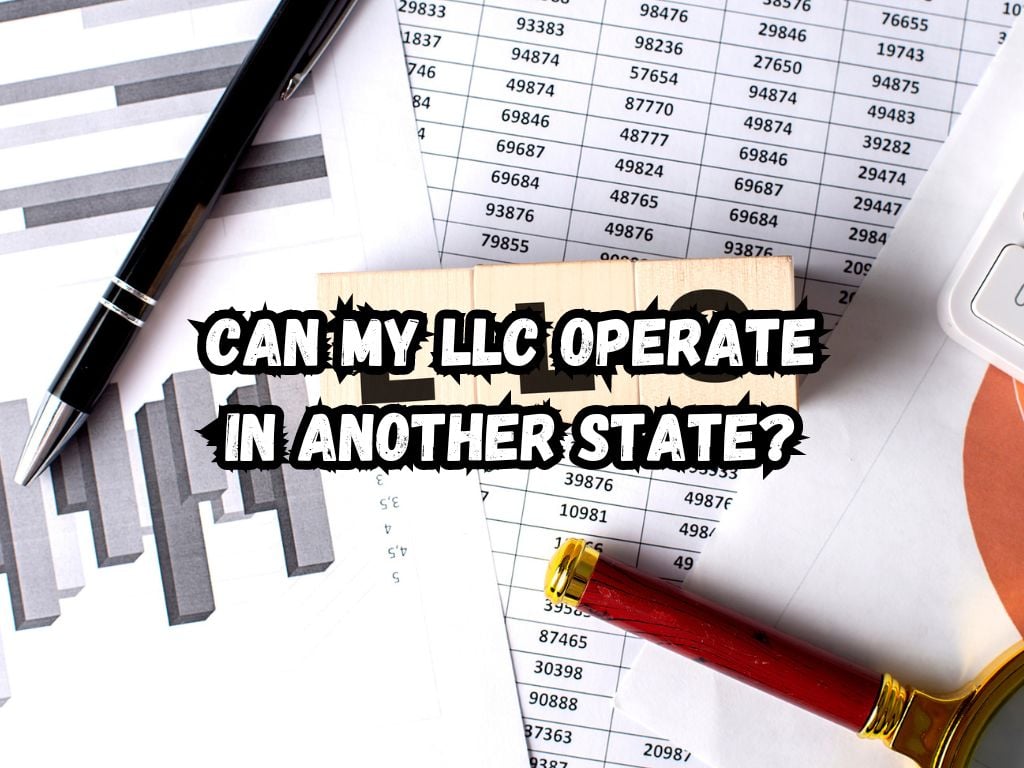Operating a Limited Liability Company (LLC) offers entrepreneurs a blend of limited liability protection, flexibility, and tax benefits.
As businesses grow, expanding operations into new states becomes a viable consideration. However, this move brings up critical legal and regulatory questions. So, can my LLC operate in another state?
What Does it Mean for an LLC to Operate in Another State?
To grasp the concept of an LLC operating in another state, it’s essential to understand what “operating” entails.
This term can cover a wide range of activities, from opening physical stores or offices to having sales representatives in the area. The reasons for expanding are as diverse as entering new markets, seeking talent, or leveraging strategic partnerships.

Can my LLC operate in another state?
The short answer is yes, but it’s not as simple as just deciding to set up shop in a new location. An LLC formed in one state is considered “domestic” to that state and “foreign” to all others.
To legally operate in another state, your LLC must comply with that state’s laws and regulations, which often involves a process known as “foreign qualification.”
Understanding Domestic LLCs Vs. Foreign LLCs
A domestic LLC operates within the state where it was formed. When it expands operations to a new state, it becomes a foreign LLC in that jurisdiction.
Recognizing this distinction is crucial because each state has unique requirements for foreign LLCs, impacting how you expand your business.
Legal and Regulatory Considerations
Expanding your LLC into another state means obeying two sets of laws: those in your home state and the new state.
This includes potentially different tax obligations, employment laws, and licensing requirements. Ignoring these can lead to significant fines and legal issues.
Steps to Register Your LLC in Another State
Registering as a foreign LLC is necessary to operate legally in another state. Here’s a simplified guide:
- Conduct a Name Availability Search: Ensure your LLC’s name is available in the new state. If not, you might need to operate under a different name there.
- Obtain a Certificate of Good Standing: This document, from your home state, proves your LLC is compliant with all current regulations.
- Appoint a Registered Agent: This local representative can receive official documents on behalf of your LLC.
- File for Foreign Qualification: Submit the required paperwork and fees to the new state’s business filing agency.
Following these steps helps ensure your LLC can operate smoothly across state lines.
Operating an LLC in more than one state introduces a complex web of tax regulations primarily centered around the concept of nexus.
Nexus determines the LLC’s tax obligations to a state and can encompass sales tax nexus, income tax nexus, and other forms of taxable presence.
It arises from various activities, including physical presence, economic transactions, or reaching a set threshold of sales within the state.
State Income Tax Requirements vary significantly from one state to another. An LLC operating across state lines may need to file income tax returns in multiple states, depending on where it has nexus.
This can complicate the tax situation for both the LLC and its members, as they must navigate different tax rates, exemptions, and credits available in each state.

Sales Tax Collection and Remittance responsibilities are incumbent upon LLCs with a sales tax nexus in a state.
Sales tax laws and rates are notoriously diverse, making compliance a challenging task. The LLC must accurately collect sales tax from customers and remit it to the respective state’s tax authority, a process that demands meticulous record-keeping and understanding of each state’s tax code.
Other State-Specific Taxes such as franchise taxes, excise taxes, and payroll taxes, may also apply.
These taxes are as varied as the states themselves, each with its own set of rules regarding who must pay, how much they must pay, and when they must pay.
Given the complexity of multi-state operations, Seeking Professional Advice becomes essential.
Tax professionals experienced in navigating the maze of multi-state tax regulations can provide invaluable assistance.
They help ensure compliance with each state’s laws while optimizing the LLC’s overall tax position. Consulting with a tax advisor familiar with the intricacies of multi-state operations is an investment in peace of mind and financial health
Pros and Cons of Operating Your LLC in Another State
Expanding your LLC beyond its original state has several advantages, including access to new markets, talent, and potentially more favorable legal environments.
However, it also comes with challenges such as navigating complex legal landscapes and managing multiple sets of regulatory requirements. Weighing these factors carefully is crucial for any business considering out-of-state operations.
Frequently Asked Questions
Do I need to register my LLC in every state I operate in?
Yes, to legally operate in any state outside of your LLC’s home state, you must register as a foreign LLC in that state.
What is a ‘foreign’ LLC?
A foreign LLC refers to any LLC that operates in a state other than the one where it was originally formed.
Does operating in another state affect my LLC’s taxes?
Yes, operating in another state may subject your LLC to different tax obligations in that state.
What constitutes ‘doing business’ in another state?
Activities like having a physical presence, employing people, or generating significant revenue in a state can constitute doing business there.
Can my LLC own property in another state?
Yes, an LLC can own property in another state, but it may need to register as a foreign LLC in that state to do so legally.
Conclusion
While operating your LLC in another state offers exciting growth opportunities, it also requires thorough preparation and understanding of various legal implications.
By considering the points outlined in this article, you can make informed decisions and set your business on a path to successful expansion.


 Tags:
Tags:










